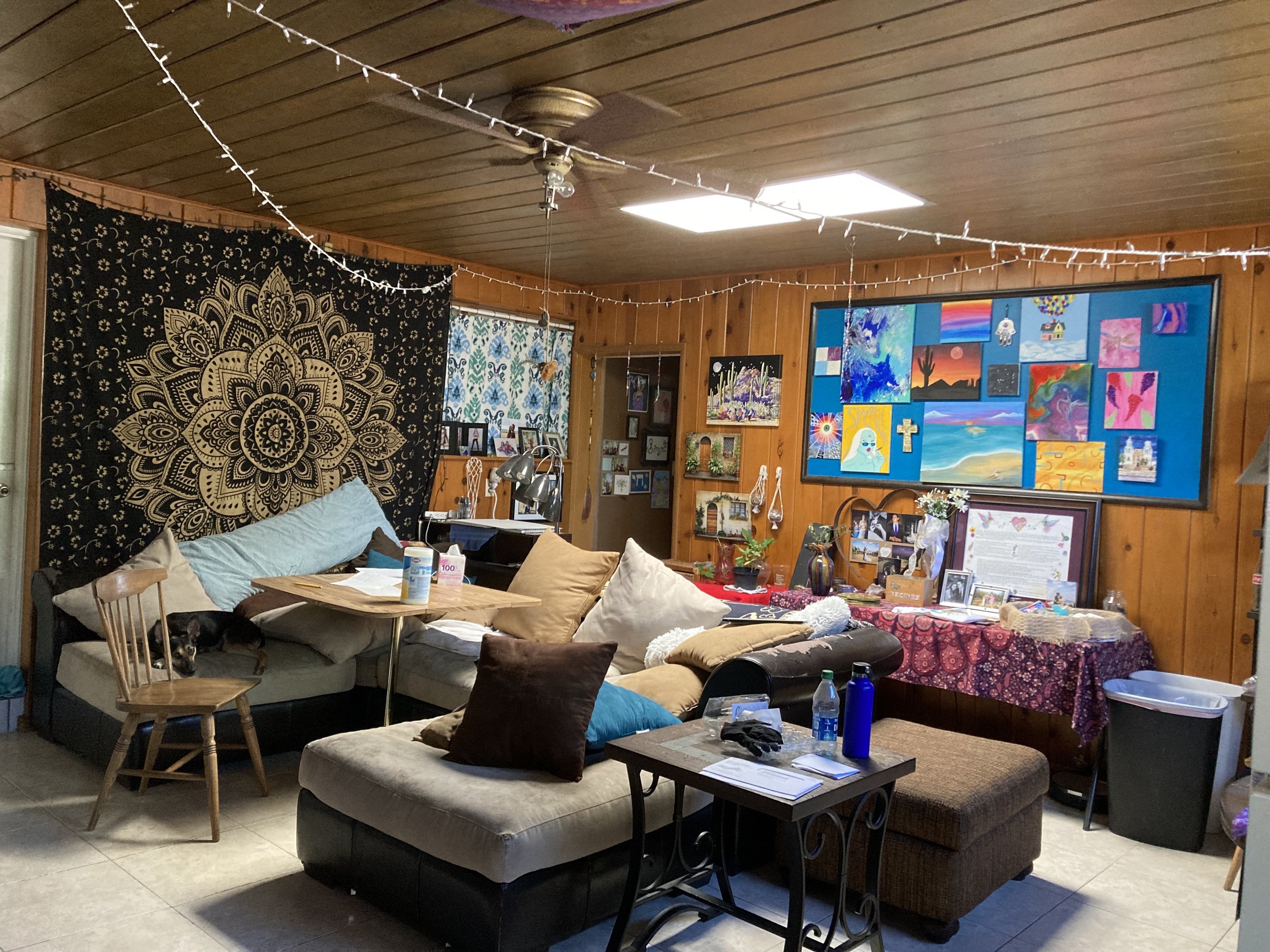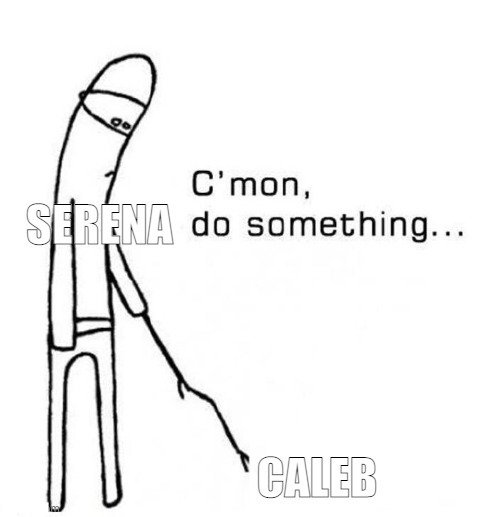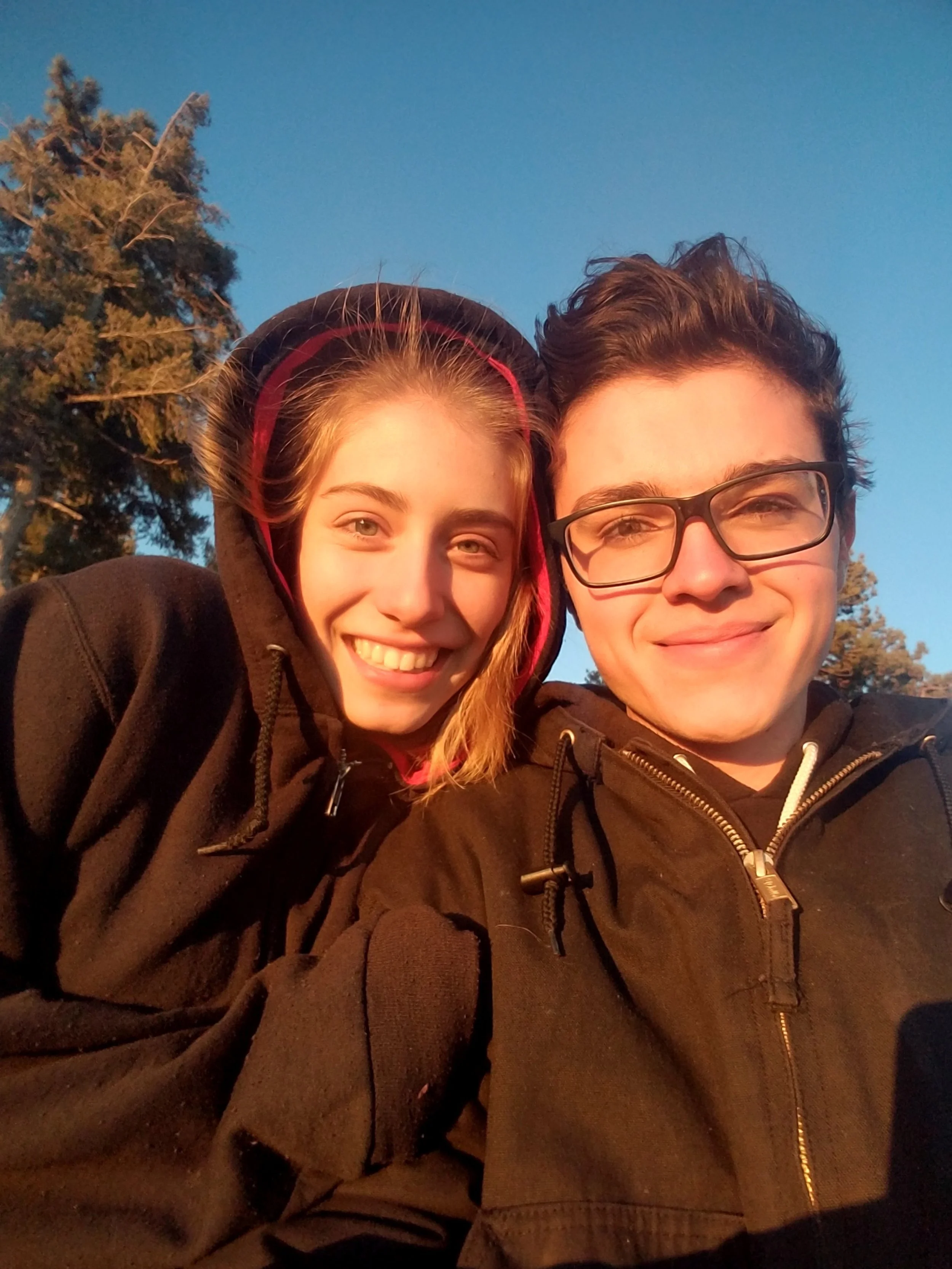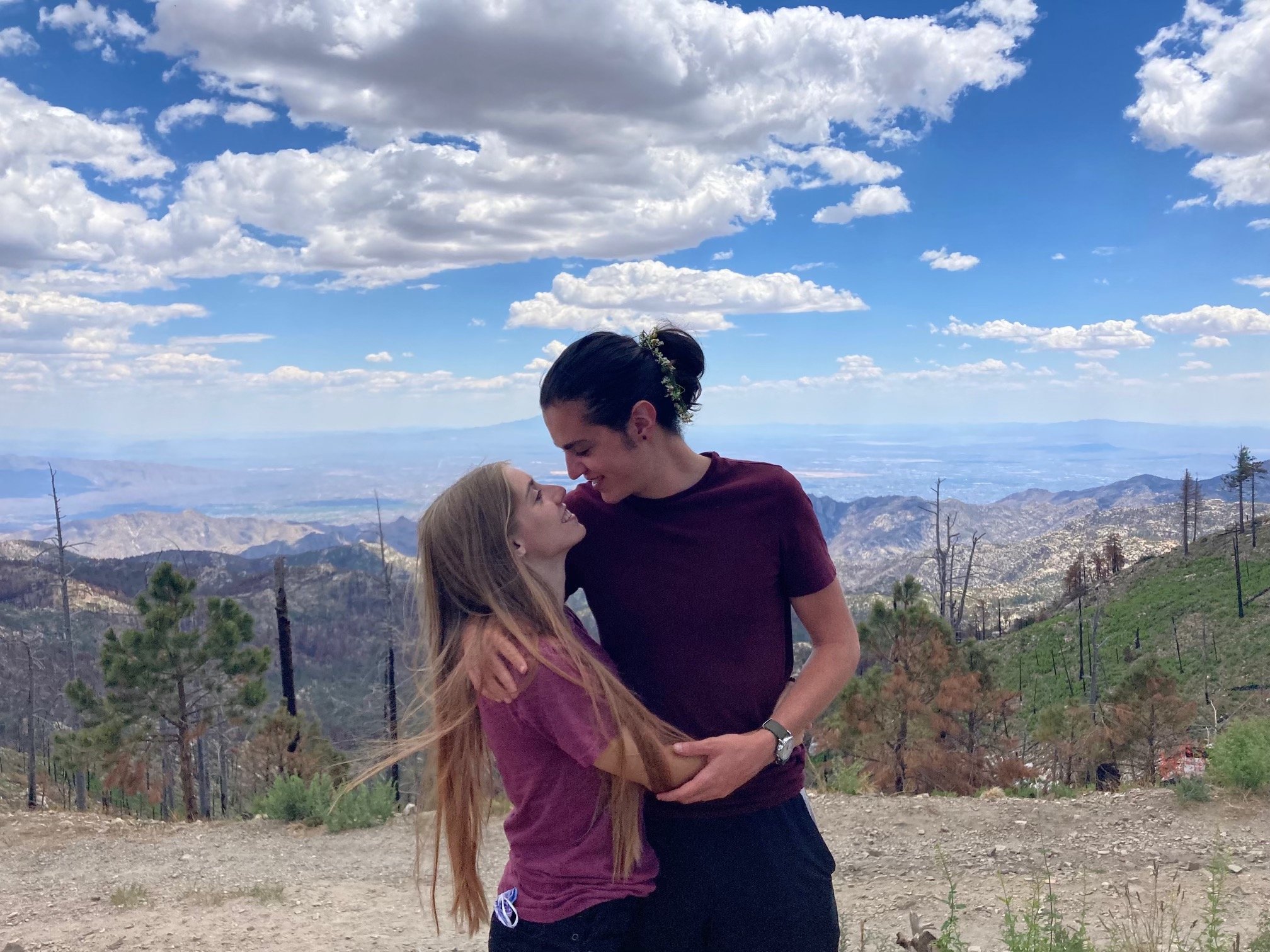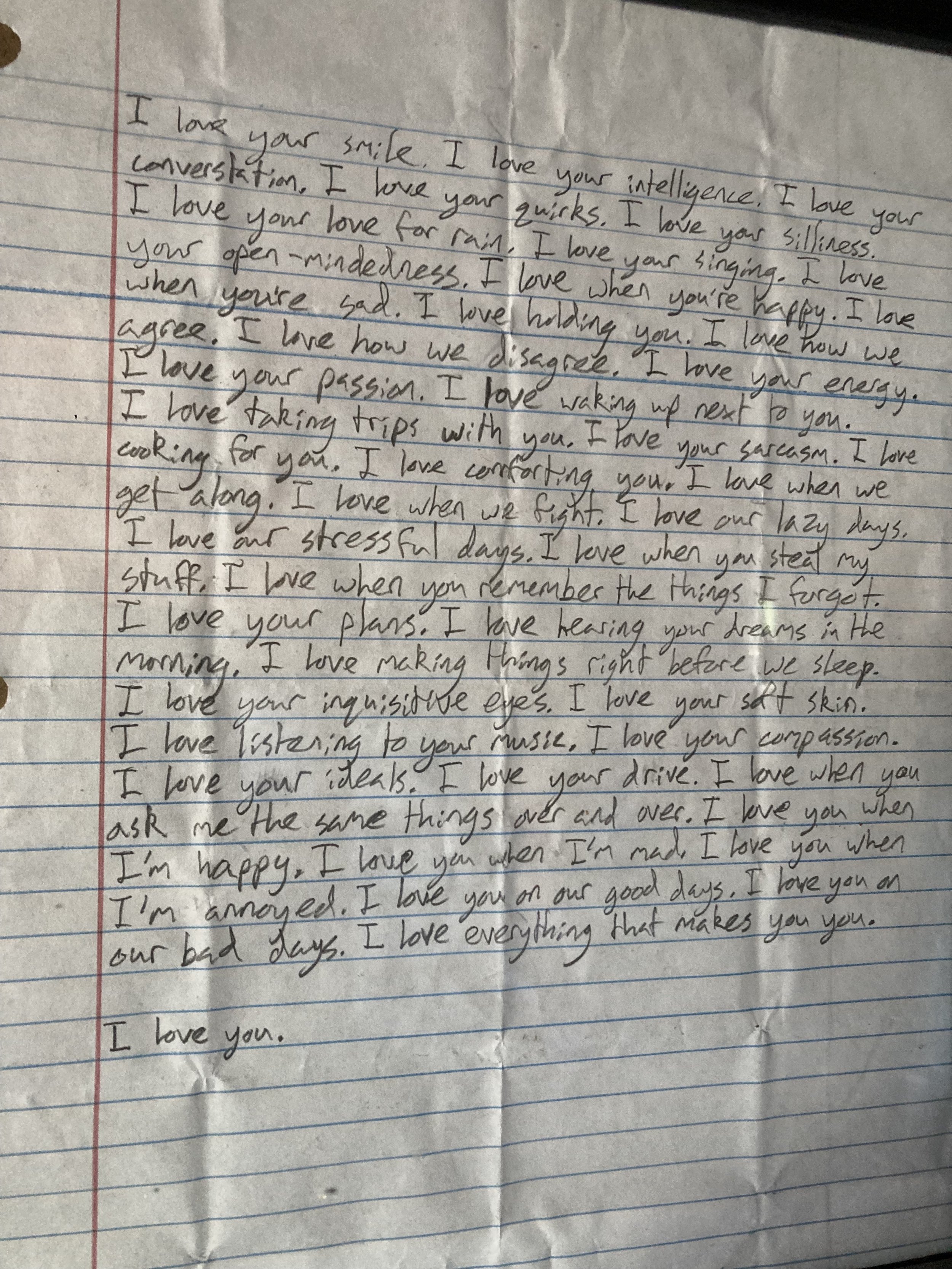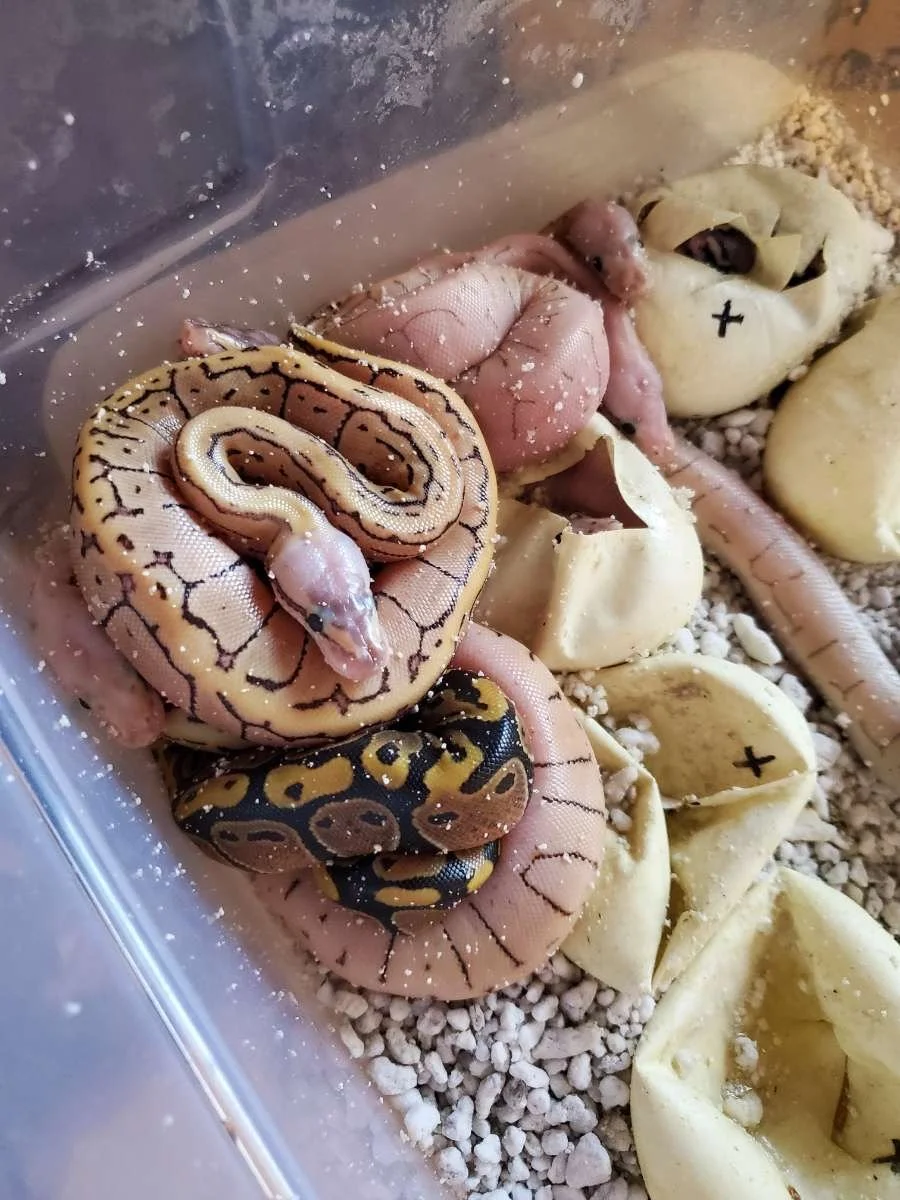If opposites attract, then Serena and Caleb’s bond through their communication couldn’t be stronger. In their differences, how do they discuss mental health, polyamory, their future, and their pasts?
The sky was lucid and the ground cast in the full moon’s soft glow as Serena and Caleb crouched around a small fire pit with two of their friends, Xia and Aubrey, in Tucson, Arizona. A cool desert breeze wrapped around them and the world hushed. The leaves of a velvet mesquite tree whispered above and even the talkative cicadas seemed to soften their calls out of respect for the moment.
Caleb, Serena, Xia, and Aubrey conducting a full moon ceremony
Set between the four friends was a glass jar filled with flower petals, herbs, and two wax candles bundled with twine. Xia spoke first, her voice reverent yet feathery, like that of someone reciting poetry. "I'm very glad that we're all getting to do this together. New people”—she smiled towards me—“and old,” turning to Serena and Caleb. Serena murmured in assent; Caleb nodded.
“What we want to celebrate tonight is your guys' love and the excitement of this whole weekend. We're using the energy of this beautiful strawberry moon”—so named by Indigenous peoples for how it signaled the strawberry harvest and occurring in June, named after the Roman Goddess of Marriage Juno—“to just really focus on this powerful happy energy that we're going to carry throughout the whole weekend.” Aubrey added, “And through the rest of your lives.” She smiled. “For the rest of your union. May it last forever.”
Caleb, Serena, Xia, and Aubrey holding hands as they conducted a full moon ceremony
Xia asked Serena and Caleb to each light one of the candles. For fifteen delicate minutes—the quietest of the whole wedding weekend—they watched as the soft flame shimmered and the jar filled with melted wax. The four friends whispered to each other as the candles burned down; a comment about how meditative it was to watch; a joke about how they’d never squatted this long before.
In this brief moment, Serena and Caleb chose to take time for themselves amid a weekend they’d dedicated to others. “Caleb and I have our whole lives to be together,” Serena had told me a few weeks before, “so the wedding is when our friends and families can come together and meet and celebrate. It reflects us, but it’s for them to enjoy.” They’d chosen to have the wedding in summer to avoid conflicts with school (many of their guests were either still in school or worked in education) and found a campground on Mount Lemmon, the highest point in the Santa Catalina mountains that outline Tucson’s Northeast, to offer cool respite from the unbearable desert heat. (The temperature each day in the week I stayed in Tucson reached 115 degrees; the mountains would be 20 to 30 degrees cooler and have far more shade, too.) They’d marry in the woods under a chuppah in accordance with Serena’s Jewish heritage, and the campground’s gazebo and large fire pit would host their reception.
Whitetail campground, Serena and Caleb’s wedding venue. Credit
Tucson is a city of sensorial contrast: extreme heat and chilly cold, blinding days and black-hole nights, military planes that roar low to the ground and break an otherwise quiet calm. Five soaring mountain ranges outline the city on all sides, like how a picture frame outlines its subject. For Tucson, that subject is a population of half a million residents sprawled over two hundred square miles. For reasons of Native history, zoning laws, and air conditioning, homes and buildings tend to rise just a single story, allowing clear views of the mountains from almost anywhere in the city. Pebbles and cacti fill front yards instead of water-hungry grass, and coyotes dart through neighborhoods at night in search of unattended pets.
A view of the University of Arizona and Tucson. You can see the Santa Catalina mountains in the background
Tucson is also where Serena and Caleb met, at the University of Arizona in a physiology lab. It was their Sophomore years, and each described an early and deep fascination with the other, though for opposite reasons. “I think we were kind of shocked that someone could be so different from us,” Caleb said. "The first time we hung out outside of class or a study session, she just sort of spilled out her entire life story. And I was drawn to that, because never had anyone been remotely that open with me."
Serena, in contrast, was drawn to how little Caleb talked and how much he listened. “We met, and I was like, how can he be so stable, so kind to me, so... different,” Serena said. She laughed. "I was like, ‘How are you so stable?’ And Caleb was like, ‘How are you…’”—she waved her hands in a circle with her palms facing towards herself—“‘all of this?"
Caleb and Serena outside the lab where they met.
Their friendship began with more benefits than dates, but they never left each others’ sides and made their relationship official after a few months. Serena moved in with Caleb soon after, and a year later in 2020 they moved into a small addition attached to Serena's childhood home, around when COVID also forced school online.
They quickly made the space their own. Colorful tapestries, paintings, and photos blanket the room’s reddish-brown wooden walls, and their two dogs, Lily—a Yorkshire Terrier who loves to sleep and eat—and Ellie—an over-eager Shepherd mix with “coyote, and maybe some goblin” who loves licking unguarded hands and faces—bounce between a pair of plush couches. A door connects the addition to the rest of the home, where Serena’s parents and grandmother live and where they all, spread across three generations, share almost every meal together.
Serena and Caleb’s living room, decorated with tapestries, art pieces, and family photos
Lily
Ellie
One night, as we chatted after dinner, our empty dishes still on the table, a faint patter sounded from the roof. Serena’s family fell silent for a few moments to listen before her grandmother squealed, “It’s raining!!” Everyone chimed their own chorus of “Rain! Rain!”, and ran to the front door. As she stepped outside, Serena’s mother took a deep breath and looked as if she might collapse. “Oh my god, that’s the best smell in the world!” The air was humid, musky, and hot, and it felt as if the whole sky might burst.
I stood and waited for the biblical flood. I was greeted instead by a few large raindrops that, as quickly as they fell, disappeared, the round marks they made on the ground evaporating in seconds.
But Serena’s family still smiled and celebrated. It was the first rain, however small, of the 2021 monsoon season, which each year brings prodigious thunderclouds and torrential floods. Rain in the desert is the wet reward for life’s tenacity, cleansing the dry dirt that has built up on every surface and renewing the cycle for yet another year. (When someone asked Serena what her plans were for the wedding if it rained, she replied, cheerily, “We celebrate!”)
Picture taken during a monsoon in Tucson. Credit
Serena’s family has long been rooted to this way of life, city, and home. Her parents both grew up in Tucson and were high-school sweethearts before they married and had Serena when they were 25. At 30, they purchased the home they still live in with Serena’s paternal grandmother, Anita, who has also lived there ever since. Serena’s cousins, with whom she has a relationship as close as siblings, lived just a few minutes away.
Serena (pink, second from left) with her father parents, brother, and cousin Danny (left)
Serena with her grandmother Anita
Serena grew up valuing her education, though beyond just grades and school. "My parents always viewed education as something that needed to be good, to be funded, to be protected,” Serena told me. “But what was most important wasn't what we got on tests, but how we were learning and developing as a whole person." This growth often happened over meals. "We had lots of family time growing up, and we'd have these big family conversations together over dinner,” Serena recalled. “And my dad would give everyone a turn to talk. If we didn't really have anything to say, that was bad. So it was very ingrained, very early, to talk about what we thought and felt."
Serena (blue shirt, right) with her immediate and extended family
I saw this myself when I joined for meals in the week before the wedding, where dinner table conversation meandered between family history, social justice, political current events, and race, all with a progressive bent and an activist fury. And I also saw, as Serena and her family lobbed topics of philosophy, fundamental rights, and justice across the dining room with ever-increasing conviction, how Caleb stayed hushed, attentive but quiet. He preferred, it seemed, to listen and nod as everyone else gestured and spoke.
When Caleb first moved in with Serena to her family’s home addition, it was this dinnertime ritual that was most jarring to him. Caleb, unlike Serena, does not particularly like to talk, a function both of his personality and of his upbringing. He grew up in Pine, Arizona, a small mountain town in the center of the state with a growing population of vacation homebuilders and retired people. His mother worked as an elementary and middle school teacher and his father worked as a paramedic and firefighter under a schedule that often meant he wasn’t at home most days of the week. Much of Caleb’s time was spent either running around the woods with friends or being at home with his mom and three younger sisters.
Caleb’s father, despite the absence his work forced, was the family’s clear patriarch, setting rules and guiding a strict dedication to school and Christianity. "My parents knew my sisters and I could all be successful," Caleb said. “Straight A’s were a given, and so they tried to push us to do our best, and told us to think for ourselves and figure things out rather than just rush to an answer." He chuckled lightly. "Which is kinda funny, because now they really do not want that to be happening." He grew up going to church each week, and though his experiences there were never traumatic, age fostered doubt and doubt fostered rejection of the faith he’d been raised with. He long hid that fact both from his family and from his church community.
A full scholarship to the University of Arizona became Caleb’s chance to finally live freely. "Getting to college, it felt like I didn't have to hide that part of me anymore," he said. "I could just live as myself, which was great." He partied a bit and made new friends, but his focus was on school and planning for the decade-long process of becoming a doctor, a goal he’d had since he was a child. Other parts of life, like finding a partner or pursuing hobbies, were only serious concerns for after residency.
Caleb with his aunt at his high school graduation
Unlike Caleb, who chose the University of Arizona to, in part, leave his community, Serena chose it to remain with hers, even as her parents encouraged her to venture further away. “They were saying that I needed to get away for a bit and grow in some other ways,” Serena told me, “but I was just thinking, ‘My family's here, everyone I know is here. Why would I want to leave that? ’" Serena, also unlike Caleb, hoped to find her life partner sooner rather than later. “I remember from even young childhood that I wanted to get married and have kids,” she said. “School and education were important, but I knew I was smart and that I’d be fine there. Family was what was really important, and marriage and kids were just an extension of that.”
If opposites attract, it’s hard to imagine a stronger pull than that created by Serena and Caleb’s communication styles. Serena speaks at the pace with which a hummingbird beats its wings: she replied to most of my questions with answers lasting 15 minutes and winding through context, caveats, and philosophy. (Once, when Serena ran through a portion of her story, seeming to not take a breath for a full minute, Caleb made a rare interjection to say, "That Eminem portion of words she just said? That's just how her brain is all the time.") Caleb speaks more like how equal opponents play chess: short moments of conviction amid long pauses of silence and thought. (Serena would often anticipate my follow-up questions and goad Caleb to share more.) Serena joked, “To me, it’s sometimes like the meme of the doodle with a stick saying, ‘Do something.’"
But opposites also oppose, and the same differences in communication that drew Serena and Caleb to one another also led to conflict and compromise. "It's definitely an ongoing process," Serena said. "We kind of go through cycles when we feel like it’s so rough, and cycles when we feel that we’ve gotten a handle on it.” She smiled toward Caleb. “As you may have noticed, he does not like to talk, and is rather quiet”—Caleb shrugged and nodded—“And it's been hard, because sometimes I'll be like, ‘What do you mean, you don't have something to say? You have to.’ And afterwards I feel guilty, because I feel like I've just harassed him by forcing him to speak.”
I asked Caleb the way his silence manifested. Was it that he had thoughts he didn't know how to express, or that the thoughts didn’t appear in the first place? "More the second," he replied. "I'm kinda just zoned out a lot of the time, and there's no conscious thoughts." I asked if he’d venture where that came from; whether the conservative form of strictness in his childhood discouraged his forming and then expressing many thoughts or ideas.
Serena seemed to agree with my guess. (She was in school for counseling psychology, and the language and frameworks from her studies often shaped how she spoke in her personal life, too.) “I think the most impactful factor in someone’s communication is definitely childhood and family,” she said. “As much as we talk about and and learn how to communicate as adults, the ways we were taught as kids are just ingrained in us.”
She turned to herself. “For me, I’ve noticed since moving back in with my parents that I tend to emulate my father much more. I got more aggressive in my communication style and heard his voice while talking to Caleb. And that’s something I’m working on, too.”
Caleb, for his part, was more hesitant to trace the same causality between his childhood and his personality today. None of that was explicitly taught, he told me, reminding of how his parents conditionally encouraged free thought, and that more likely it was the result of a home where he didn’t quite fit, and wasn’t taught or encouraged to express the dissonances he felt growing up. He said his parents expressed an appreciation for free thought and exploration, up until those thoughts crossed lines that contradicted their faith.
Serena and Caleb soon after they began dating
"It's hard to learn a different way of communicating, one that lets me be more comfortable to talk," Caleb told me. Serena spoke of the positives, as well as seeing growth. "For better or for worse, he’s so calm and stable that I've never had to worry about if he's angry at me, which was life-changing,” she said, “because my family gets angry a lot, about a lot of things, whereas he just doesn't even talk, let alone yell.” She turned to Caleb. "Hearing you talk and answer Vincent’s questions is so amazing"—she turned back to me—"because I've tried what you're doing today before, and he sometimes just doesn't say anything. But I've also learned that mostly I'm just very impatient, and he communicates best when he has more time to listen and think before responding."
If necessity is the mother of invention, then contrast is the impetus for communication. Serena and Caleb inhabit very different internal worlds. Where Caleb’s is silent, Serena’s is thunderous. She’s been given different mental health diagnoses over the years—OCD, anxiety, bipolar, autism—and tried different remedies—breathing doctors, various pills, therapy. What remains consistent across Serena’s life is learning, step-by-step, how to communicate what she’s experiencing. “I try different things all the time,” she said. “I very much feel like words often can't portray what I’m experiencing, and so I use sounds or movements with my body to explain how I feel.”
Within her and Caleb’s relationship, this hasn’t always been painless. Caleb told me about miscommunications and frustrations and how, over time, regardless of if he fully understood what Serena was trying to communicate, he’s learned to at least validate her experiences and to do his best to listen and learn. “If I ask how she’s feeling and she’s unable to respond verbally, but I make a specific noise or body movement that I can do with her, it can feel much more like we understand each other than if we just try to talk,” he said.
“There are no wrong answers,” Serena added. “And that’s something I want others to know, that it’s okay to try new things as long as it works for you and isn’t harmful; that what works will also change over time.”
The same lessons have also been true in their other relationships. Both Serena and Caleb identify as pansexual—attraction to others without regard to gender—and explore their identities amid their own committed relationship through polyamory. To them, friendship, love, and attraction shouldn’t be limited to only a single partner.
They talked early in their relationship about what a polyamorous lifestyle might look like—their motivations, limits, commitments to honesty and communication—and settled on two baseline principles: they promised to be honest about how they felt, and they wanted their relationships to form real connections; to be dating, and not hookups. "It was about so much more than sex,” Serena said. “We wanted to be able to have real emotional connections with people.”
Like with mental health, how they communicate about polyamory changes over time. They each talked about a learning curve. “It’s not something that’s widely accepted in society,” Serena said, “and even if people do accept it on an individual level, the values it requires are so different from what we’re taught about relationships. All of the potentially toxic ideas we’re taught about ownership and jealousy and entitlement in relationships have to be thrown out, and you have to truly analyze what you want rather than simply follow a script that’s been handed to you.”
These days, the way they communicate about polyamory is more similar to quotidian conversations—what’s for dinner, current events—than the shocking, drama-filled caricature that some may associate with polyamory. “Our polyamory conversations tend to be easier to have than our other serious conversations,” Caleb told me, “because in the latter Serena is usually upset about something, whereas polyamory isn't about bad things. I feel more involved in and affected by our polyamory conversations, and so it’s easier for me to care and to have things to say. It’s very much part of our lives and relationship, not a separate thing we have to remember to discuss.”
Both have seen it as having a positive impact on their relationship. “It’s a great way to work on trust, communication, scheduling, and responsibility,” Caleb said. Serena added, “What I love most about it is you're given more agency in defining your relationship, and there's so much possibility and opportunity. Like, no, you don't have to be in the stereotypical, boomer heterosexual loveless marriage where you stop having sex and start hating your partner. No, you don't have to sacrifice things you like because your partner doesn't like them. No, you don't need to have sex with all your partners. No, there’s no way anything has to be. You and the people in your life get to choose and create.”
A few days before their wedding, Serena and Caleb introduced me to two people they were dating, each of whom also had either one or multiple other partners. "Their partners are also our friends," Serena said, "and that's ultimately what made our relationship with our partners feel more like friendships. Because yes, we're dating them, but our friendships are most important, and that means being friends with their friends, too."
Both people attended Serena and Caleb's wedding, and I had the chance to talk a bit more about their relationship with one of them. She told me about how her connection with Serena and with Caleb were very different. She and Serena shared a lot of the same experiences and worldviews. They studied similar subjects in school and had dealt with similar mental health diagnoses. “We connected over deep stuff, always analyzing ourselves and talking about all the experiences or traumas we both had,” she told me. Her relationship with Caleb, in contrast, rooted less in deep conversations and more in simply being together and appreciating each other’s niche interests. “We party and have fun together,” she said, “and bond over things like how he's super into snakes and stuff."
I asked Serena and Caleb about the ways others have understood their polyamory and how that in turn affected their own relationship. Neither their families nor most of their friends had ever practiced it, but most were supportive, even if they would never adopt it in their own lives. "Even when they think about it and decide that it definitely isn't for them, I think it's cool that that conversation even happened, and that people are just more open about it,” Serena said. "I was a psychology major, and I like studying how people think and react to things. So it's interesting to see how some of our friends who are very strictly monogamous are just amazed when I say that Caleb and I can have feelings for other people and we're both, like, fine with it."
(She and Caleb, alongside many others who practice polyamory, often explain their lives in memes and analogies, like the one below:)
Serena shared about how a therapist once explained, to her disagreement, why she was okay with the practice. "This therapist basically said I only did this because now it's impossible to get cheated on and that makes me feel safe,” she said. “And even though that's not true, polyamory did actually help with jealousy and trust issues, because it allowed me and Caleb to set boundaries and communicate clearly about them. Jealousy and trust isn’t about actions. It’s about boundaries and communication."
They continue to grow and communicate better each day. "We've been trying this new thing," Serena said, "where instead of getting mad when he doesn't really reply, I just say, expand, which is a cue to be like, ‘Oh, I should say more.’" Others also commented on Caleb's growth. "He comes from a very different background than our family," Anita, Serena’s grandmother, told me, "and so it's been interesting to watch him gain a kind of confidence in defining his own belief system, even though he's pretty quiet and that's not his natural state."
Caleb himself told me about the ways, often subtle, he’d been trying to learn how to express himself, too. “You always know what Serena’s feeling, because she says it,” he said, “and in more subtle ways, I think I’m working on that too. Stuff like growing out my hair, getting piercings, trying out art projects or singing. Essentially, things that I was told I was bad at or discouraged from doing because of gender roles and expectations of what is acceptable for a ‘male of my potential’ growing up”
Caleb and Serena in 2021
Polyamory, rather than diluting Serena and Caleb’s commitment to one another, concentrated it. They set up regular check-ins to talk about their relationship, and Serena was clear from the start that she wanted it to be serious. "To me, dating was always with the intention of marriage,” she said, “and so that's what I always wanted to have in a relationship." Caleb shared Serena’s views of wanting to be married, but differed on the timeline. He wanted to wait until well after medical school; she wanted to be married before the end of college. "I'd never said ‘I love you’ to anyone before Serena,” Caleb told me, “because I'd told myself that I wasn't going to say that unless I was ready to be with them for life. And so I held out saying it to her for a long time, too.”
Serena and Caleb together in 2019
His subconscious ultimately exposed him. "Caleb talks in his sleep," Serena said, a large smile on her face, "and one night in August 2019 we were in bed and he was already asleep while I was still awake next to him. And he turned towards me and said, ‘I love you’ in his sleep.” She began to laugh. “I knew his views about not saying ‘I love you’ until he was ready, and so when I heard that I was kind of just like...” Serena raised her eyebrows and tilted her head, re-enacting her surprise. Caleb chuckled and admitted, "I’d been wanting to say it for a while.”
When he woke up, Caleb asked Serena if they could talk. He said ‘I love you again,’ sparking a conversation about what marriage would entail. They began searching for rings in February 2020, and talked about their engagement and wedding planning in Spring of 2020.
Caleb proposed on July 1st, 2020. He and Serena were at home, and their conversation started off serious. "If I had nothing, would you still be with me?" he asked Serena. She replied yes, and asked about the question behind the question. Caleb replied that he’d realized he didn’t want to actually go to medical school or become a doctor anymore, uncomfortable with the hours it’d take away from time spent with family or on hobbies. “I’d always thought about it from a place of financial security; make good money and retire and actually live my life,” Caleb said. “But eventually I realized I couldn’t say I wanted that job and lifestyle with the same conviction anymore, and that just kept snowballing.” To Serena, the news was a relief, not a sacrifice.
He asked Serena to wait in their bedroom as he went to the living room. When he came back, he had a ring box. Inside was the ring they designed together—an aquamarine gemstone flanked by diamonds—and a folded-up, hand-written note. It was heavily creased from its short journey in the ring box. On it, Caleb had written a page of forty-two reasons he loved Serena:
He knew Serena wanted a more private proposal. They framed the note afterwards, and hung it above their bed.
When we first talked in the spring of 2021, Serena and Caleb had both just graduated from college. The future, they said, was uncertain but also free from many of the worries that weigh down a new, young couple. Generous scholarships freed both from the weight of student loan debt and Caleb, having decided not to pursue medicine anymore, structured his life around trying new things he actually enjoyed.
Exactly what those things were, Caleb wasn’t quite yet sure. “It might happen quicker, but I’m planning on just taking about two years to sort of do whatever experiences fall into my lap,” he said. “Take some opportunities to gain some more real world skills.” He’d begun working with Serena’s father on home repair and flipping houses, learning handyman skills like painting and roofing.
He’d also tried more unconventional hobbies. One of the rooms in his and Serena’s home was kept closed the whole time I was there. One day, they asked if I wanted to see what was inside. A rush of hot air hit us as they opened the door. The room was heated and filled with wooden and plastic boxes with power cables running all around. Caleb lifted a few lids over some wooden boxes to reveal a large bunch of incubating eggs. “I really like snakes,” he said, “so I figured I might try to breed them.”
An early clutch of Caleb’s snakes
He’d also tried cultivating edible mushrooms. “The lifecycle of mushrooms is so fast,” he said, “and so it’s very fun to grow them.” He said wistfully that it might be fun to grow and then sell some at a local farmer’s market, but also noted that turning this or anything else he was trying into a real career or business wasn’t yet a priority. “I’m just trying a lot of random stuff right now,” he told me, “and taking any opportunities that are intriguing and happen to come along.”
While Caleb planned to spend time exploring hobbies and finding what he might want to do in the future, Serena already knew her plans: after the wedding, she’d be starting a Master’s in counseling and getting her therapist’s license. “To me, you don't work just to work; you work to do something useful,” she said. “And so I want to do something that matters to me.” She and Caleb hope to someday open a therapy center focused on natural remedies, part response to Serena’s own negative experiences with existing treatments for mental health, part natural merger of her and Caleb’s skills and interests. “Having done it a lot, talk therapy and medication are not ideal, and honestly it doesn’t work for most people,” she said. “And so I think it’d be nice to offer different kinds of options.” Her mother was a pilates teacher and could teach physical and meditation-based classes, while they could also offer things like art and music therapy. Recent research into the positive benefits of psilocybin, the active ingredient in magic mushrooms, had also caught their eye.
As important as their careers are to them, Serena and Caleb also agreed that family would occupy their lives’ centers. Serena did allow for a caveat, though; “I am not going to be the mother that’s just only at home with the kids.” She turned to Caleb, and smiled. “He does have an interest in being a stay-at-home dad though, so maybe...”
“We’re just kind of going with the flow right now,” Caleb said, “keep the groove we have.” That groove, for many months, centered around planning for their wedding, held in June of 2021. Serena and her mother, both the type to counter anxiety with exhaustive preparation and giant spreadsheets, had guided most of the preparations.
They were nervous to gather so many people. More guests, eager for a reason to party, had RSVP’d than expected, and a 150-person wedding felt like an extreme way to break a year-long streak of COVID isolation and social distancing. But it was also worth it—when else would they have the chance to gather all of their closest friends and family?
The day before the wedding, Caleb, his high school friend Tyler, and I drove up the mountains together in a friend’s bright yellow 1970’s Mustang. The car’s engine rumbled as we climbed and the scenery changed from rows of suburban houses to hills and valleys filled with Saguaro cacti, their pitchfork tops reaching high above the ground before being replaced with tall alpine trees able to grow at higher elevations. The windows were rolled down and the hot desert air that dried our faces turned to a restoring mountain breeze. We stopped along the way to look back at Tucson, its outline clear in the neat clusters of homes that filled the land between the mountains.
View of Tucson from the Santa Catalina mountains
We arrived at the campground in late afternoon and gathered to rehearse the wedding under a chuppah, in this case a quilt that Serena’s grandmother had originally made for her daughter’s (Serena’s aunt) wedding, with fabric assembled across over six generations of family members and symbolizing their support and guidance. Pine trees towered around, giving audience to the small rehearsal alongside fallen and blackened brethren, victims of a fire the previous year and whose charred remains slowly turned into the forest’s next source of life.
Caleb and Serena with their friends and family rehearsing the wedding
After the rehearsal, we walked up a small trail to an overlook in the woods for the Ketubah signing, a Jewish wedding tradition to document, in writing, a couple’s commitments to one another. “My mom and grandma spent so much time hand writing and painting it,” Serena said, admiring the framed sheet of paper. Her grand-aunt welcomed everyone, and recited melodic recitations in Hebrew to mark the start of Shabbat. They then passed around two braids of challah and signed the Ketubah.
Serena and Caleb’s ketubah
A day later for the wedding, a pile of portable camping chairs greeted guests near where the ceremony would be, on a small ledge overlooking the forest. Guests bunched in groups along the slope, which tilted upwards towards the Chuppah.
Caleb and Serena’s wedding ceremony
A small tent had been pitched a few dozen yards behind the chuppah as a campground-friendly version of a couple’s suite. Serena and Caleb sat inside it, stealing a few moments to themselves before the ceremony began. Caleb helped Serena put on her heels as their family and wedding party assembled around them outside the tent.
Caleb helping Serena with her shoes
At 4:20pm, Serena’s cousins, Mina and Aslan, began the ceremony by singing All of Me by John Legend and Put Your Records On by Corinne Bailey Rae. Serena’s brother, Rey, and her cousin, Danny, then played a song on guitar that Serena’s father had written and played for Serena’s mother at their own wedding 24 years earlier. As they played, Serena and Caleb’s wedding party walked down a dirt path from the tent to the chuppah, outlined by rocks and sticks placed there the previous day. Caleb walked with his mother, and Serena walked with both her mother and father on either side.
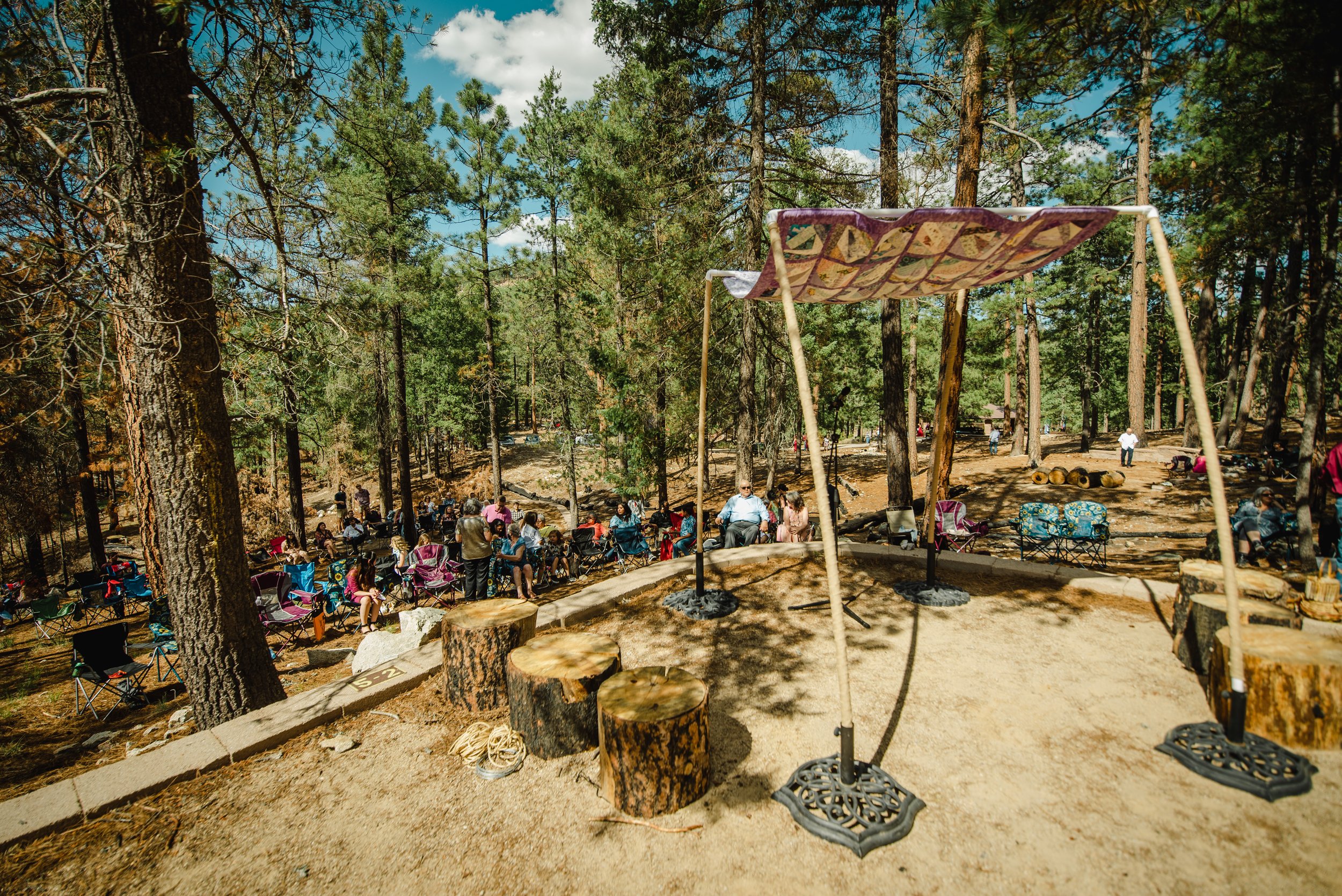
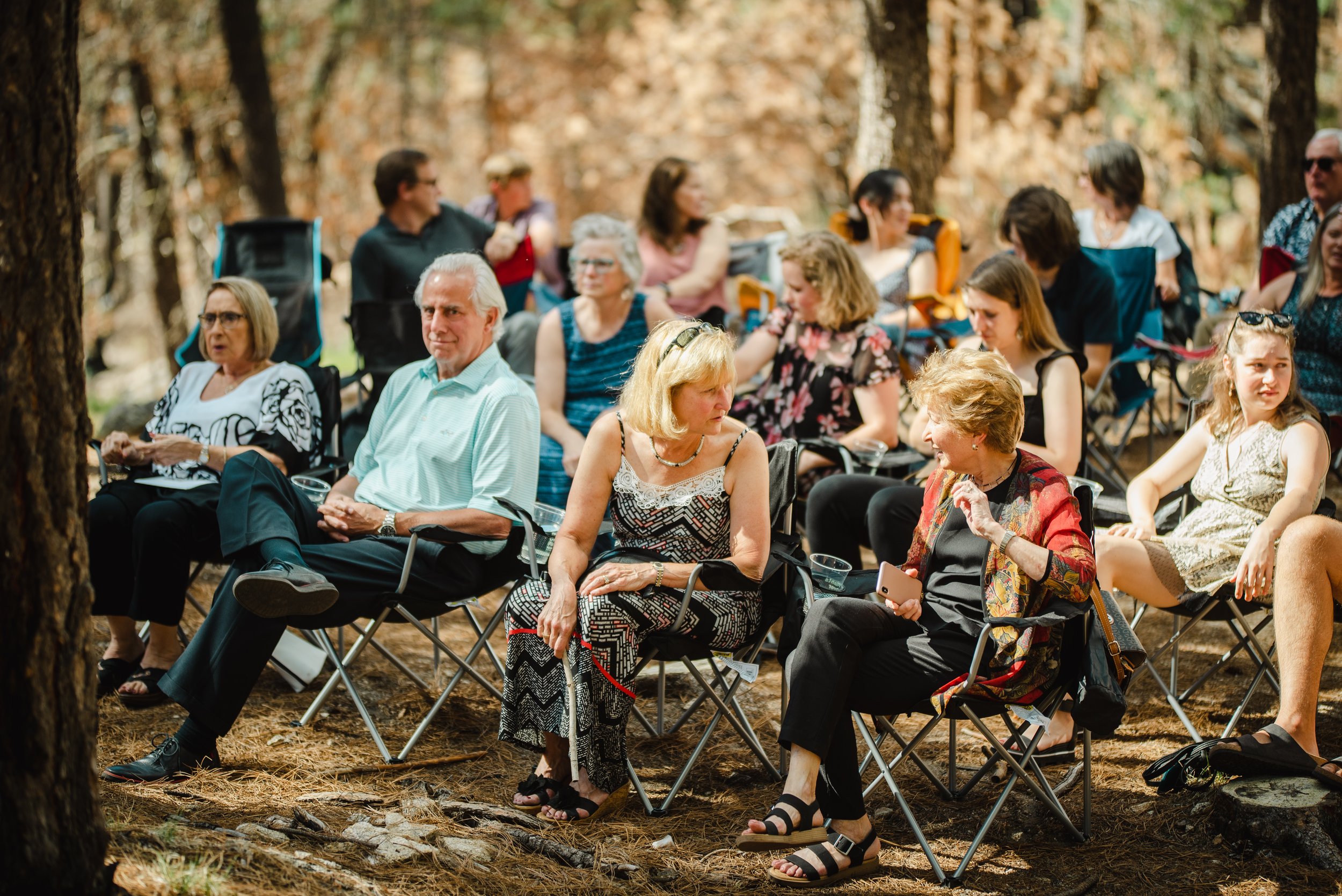
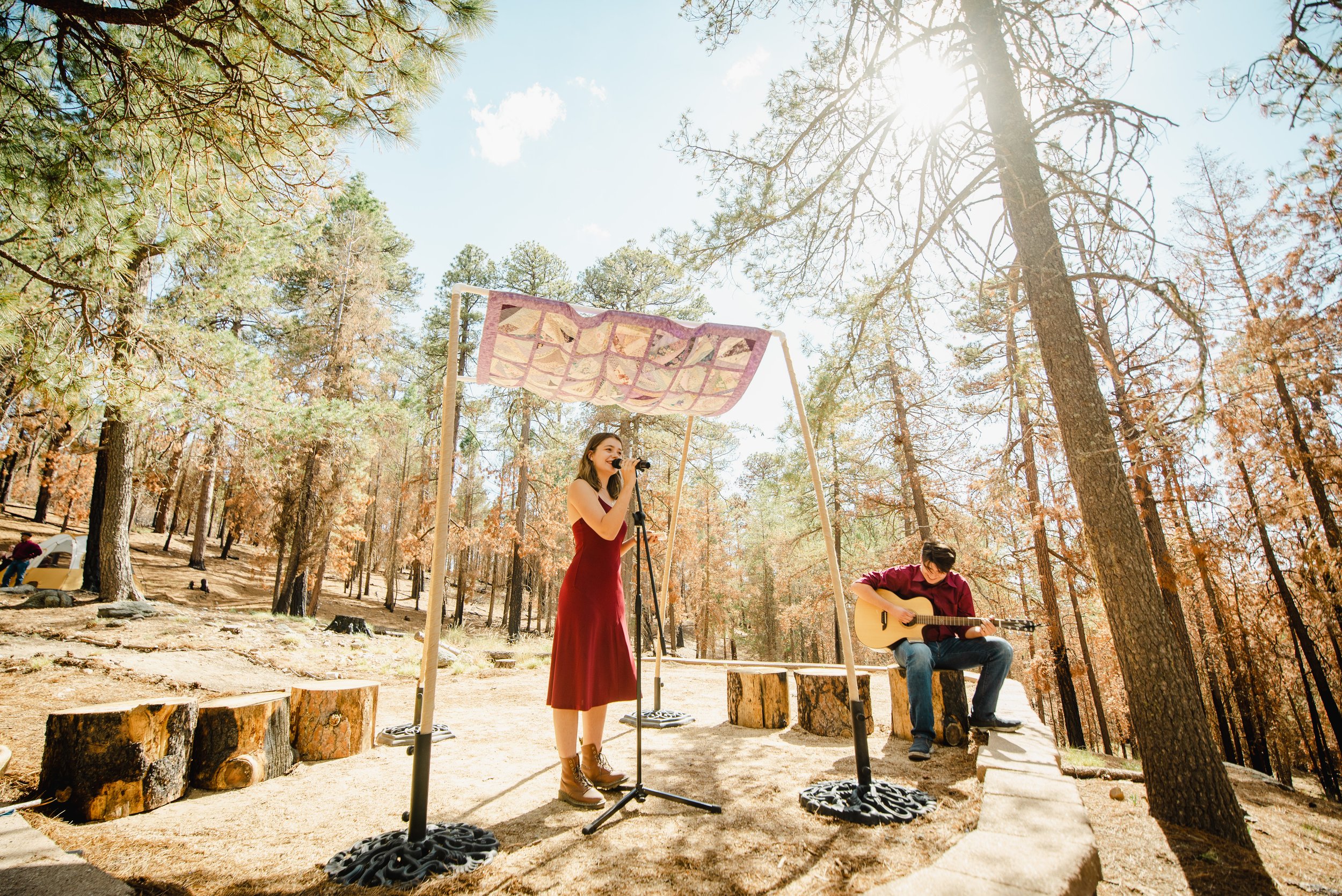
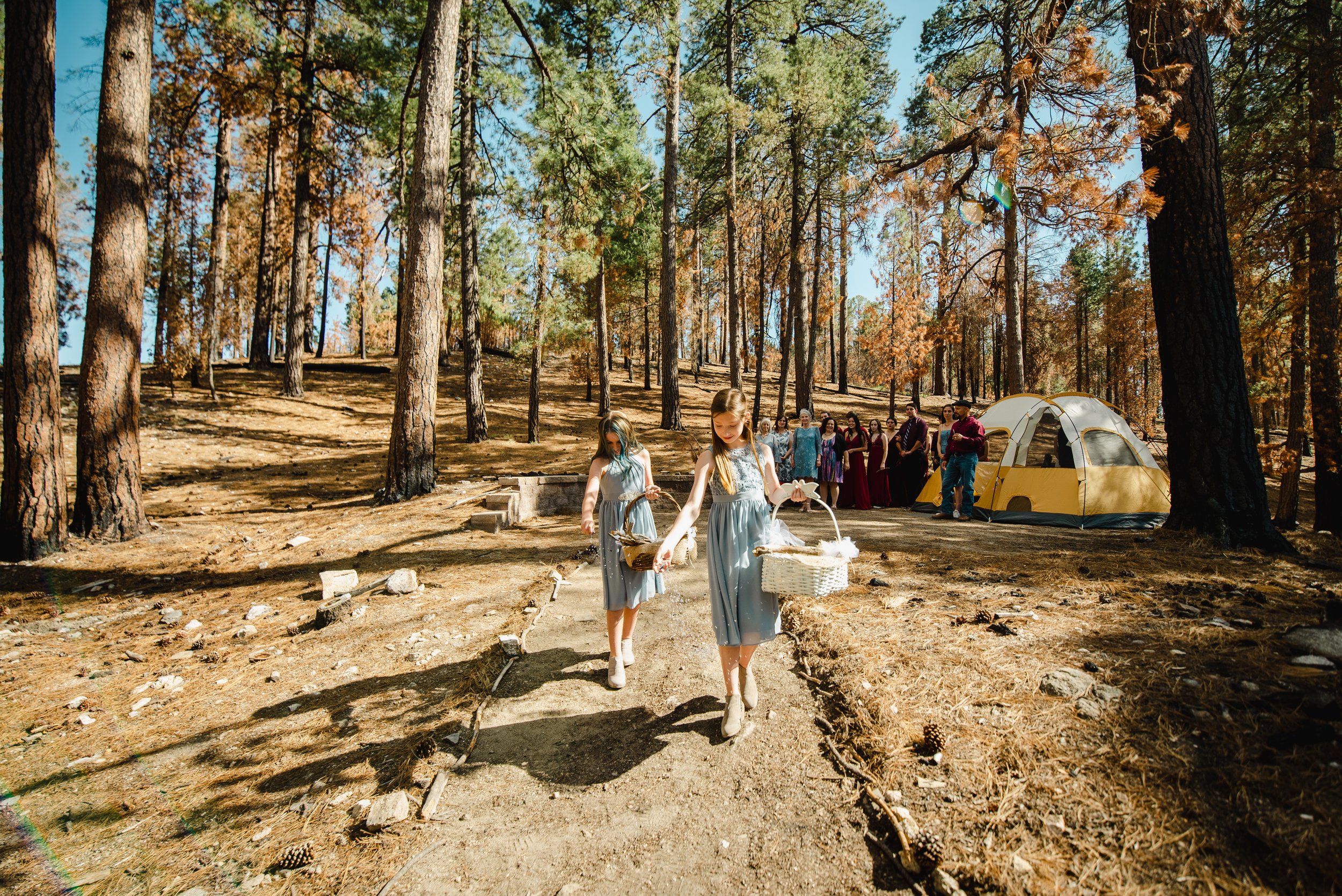
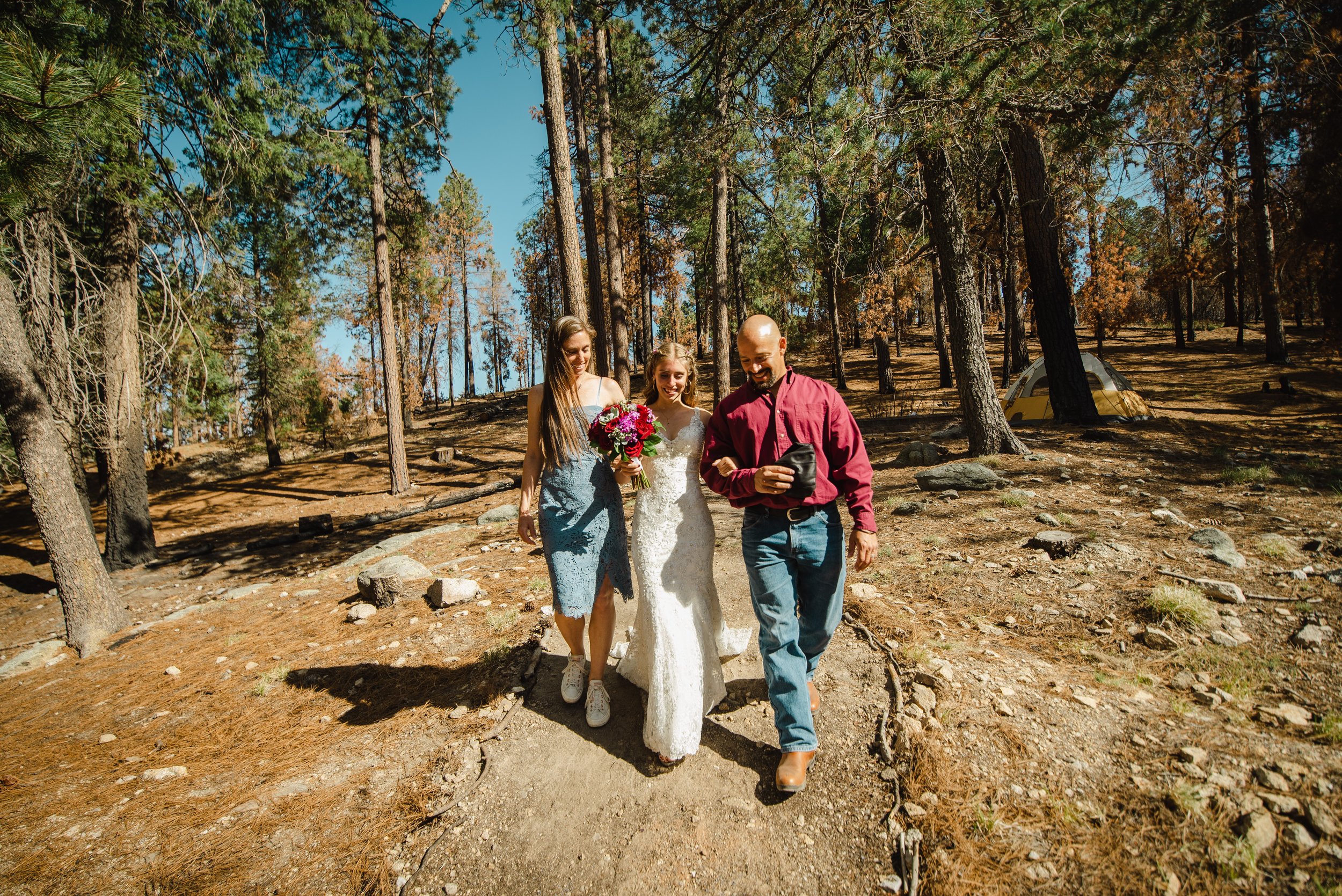
Andrew, one of Serena’s extended family members, spoke into a microphone connected to two portable speakers placed a few dozen yards away so those further down the hill could hear him. He read from a script that Serena and Caleb had written themselves.
“Welcome family and friends. We gather here today to witness and celebrate the marriage of Caleb and Serena. This is not the beginning of a new relationship, but an acknowledgment of the next chapter of their lives together. A brief moment in time and the stroke of the pen are all that is required to create the legal bond of marriage, but it takes a lifetime of love, commitment, and compromise to make a marriage durable and everlasting.”
“You have probably noticed and maybe even commented on how aspects of today’s events are a bit untraditional. Caleb and Serena specifically chose many of the details of today’s celebration to symbolically add to the ceremony.”
“The most obvious is the location. COVID made it preferable to be outdoors during the planning of today’s event, but beyond that there are reasons for this location. We are surrounded by natural beauty and open space. Here we witness harmony and wander beyond the man-made constructs of buildings and traditions. Nature is precious, magical, full of life, and should be both respected and revered.”
“The month and day today, June 26th, also hold special meaning. June is Pride Month, and on this date in 2015 the Supreme Court of the United States ruled that same sex marriages must be allowed and recognized in all 50 States. Caleb and Serena chose this day as a historic occasion of love, celebration, and joy, as well as a reminder to be unapologetically authentic. Love is not constrained by gender, and people should not be defined by others’ expectations.”
“The Chuppah is the structure being held up above Serena and Caleb. In Jewish culture it traditionally represents the home the new couple will be building, and is held up by 4 men. Today, it represents the openness, hospitality and welcoming atmosphere Caleb and Serena intend to create in their home, and the strong pillars of support provided by those who love them.”
“In keeping with the symbolism of the support poles representing the couple’s support system, we ask everyone to join us in holding up a stick. As we hold up our sticks, I invite you to take this time to silently join me in praying for the new couple and blessing their union, as I recite the Sheva Brachot, or seven blessings.”
“We acknowledge the unity of all, expressing our appreciation for life’s sweetness.”
“We acknowledge the unity of all, realizing that we are deeply interconnected. May you find comfort in your similarities and celebrate the qualities which make you different. May you be inspired each day by the abundance and diversity of the natural world.”
“We acknowledge the unity of all, recognizing and appreciating the blessing of being human. All people have the capacity for love, generosity, kindness and compassion. May you express these qualities freely with each other and be blessed to receive them throughout your lives together.”
“May rejoicing resound throughout the world. May we envision a world in which persecution and oppression cease and all people and animals learn to live together in peace and in harmony with their environment.”
“From the source of all, we call forth an abundance of love to envelop this couple. May you be for each other true partners, companions and best friends.”
“We acknowledge the unity of all, and today we highlight joy and gladness, peace and tranquility, delight and cheer, love and harmony. May we all witness the day when the world’s dominant sounds will be the sounds of happiness, laughter and celebration.”
“Blessed be this marriage. May we all rejoice together.”
After the ceremony, I thought again of how Serena had told me she and Caleb wanted the wedding to reflect their values and beliefs but that it was ultimately for their friends and family to enjoy. They invited everyone to enjoy the food (Sonoran hot dogs, wrapped in bacon and topped with pinto beans, onions, and tomatoes, as well as tacos) amidst the forest and to explore the campground and enjoy their time in nature. We took family portraits before Serena changed out of her long white wedding dress into another all-white outfit for photos with Caleb: pants, a dress shirt, and Adidas sneakers with rainbow trim.
Near their ceremony site was a gazebo with picnic benches for guests to sit at and eat. Serena and Caleb’s sweetheart table was a simple folding table covered in a red cloth and a bouquet of flowers, in front of which flew a large LGBTQ+ flag and another with symbols from all the major religions.
I overheard some of their guests talk about the ceremony and the ways Serena and Caleb shared their beliefs throughout the wedding day. Most had been delighted by the gestures, and I especially found their vows, written and spoken in full the night before during their Ketubah signing, to be powerful in sharing what they believed.
Vows are just words, ultimately, and words are far easier to say than to turn to action. Amid the pressure and presence of hundreds of family members and friends, it’s easy, for a couple and their guests, to view those words with optimism, project the ease of saying “til death do us part” onto the struggle with which life will do everything it can to beat death in that commitment.
But vows are still words, and words still carry weight. There is no communication without them, no responsibility to a promise broken if it was never made in the first place. And so these are the words that Serena and Caleb promised to each other, the words they recited first in front of two dozen family and friends when they signed their Ketubah, and then in front of a hundred for their wedding:
“On the 26th day of the sixth month in the year 2021, on Whitetail campground in Mount Lemmon, Arizona, Serena, daughter of Freddy and Deborah, and Caleb, son of Philip and Candace, joined each other before family and friends to enter into a mutual covenant of marriage, with love and compassion each vowed the other.”
“Today, I love you completely, as I did yesterday, and as I will tomorrow. You are my life. You are my dreams. You are my joy. You are my love. You are my everything. We hereby promise to work together to build a harmonious relationship of equality.”
“We shall always endeavor to be open and honest, understanding and accepting, loving and forgiving, and loyal to one another. We shall respect each other's uniqueness and help one another to grow to our fullest potential. We will work to be the best partner, parent, and person we can be. We promise to remain in united front and never leave the other person to fend for themselves in a time of need. We promise to be kind and patient with each other and ourselves. We will engage in each other's spiritual journeys and explore the universe together.”
“We vow to put each other first above all others and act with each other's best interests at heart. We promise to always be honest about our thoughts, feelings, needs, and desires. We strive to listen without judgment, act without resentment, and love without condition. We acknowledge the individuality of one another, and trust in our commitment to our family and union. We believe that each relationship has something unique to offer, and trust each other to cultivate only those which will enrich our lives. We seek not to isolate the other but instead encourage each other to explore, grow and connect.”
“Together we shall create a home filled with learning, laughter, and compassion, a home wherein we honor each other's cherished family traditions and values. We shall always prioritize family over work, and happiness over money. We shall value progress over complacency and uncomfortable communication over uncomfortable silence. We shall foster a family culture of acceptance, openness, respect, and trust. We shall teach our children about justice, equality, community, and peace. We shall emphasize self expression and authenticity.”
“We will cultivate creativity, inspire imagination, and manifest mindfulness. We will discourage shame but encouraged humility, just as we discourage conceit while encouraging confidence. While we are dedicated to instilling our values in our children, we will always appreciate their individuality and uniqueness. We enter into this union understanding the biological and emotional baggage which we each carry, and will remain conscious and dedicated to expanding the good and minimizing the bad. We will monitor ourselves and our children with caution without enforcing a self-fulfilling prophecy. Let us weave our commitment to nature and humanity into the fabric of our lives. Let us build a home filled with loving affection, laughter, wisdom, and a dedication to peace and harmony for all the world.”






